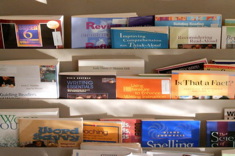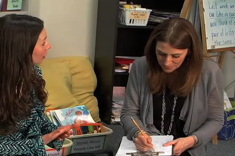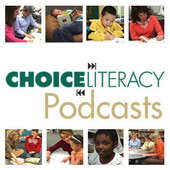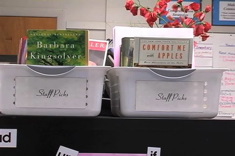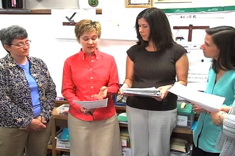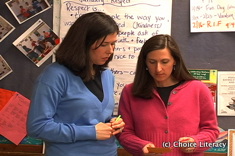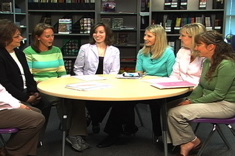Leadership
Do you guide teachers, specialists, and literacy coaches? Here are tools, advice, and strategies school leaders need for their daily work in staff meetings, study groups, and one-on-one discussions with colleagues. If you have a leadership role in coaching teachers and designing professional development, you'll want an upgraded membership with access to our Leaders Lounge.
Latest Content
Coaching Beyond the Curriculum: Reframing Our Talk and Attitude Toward Difficult Students
What role should literacy coaches have in helping teachers manage unruly students? Melanie Quinn settles into a morning of poring over assessment data, only to have it interrupted by a child who has been disrupting his class. Her interactions with Darren and his teacher lead to strategies for helping colleagues take an inquiry stance with challenging children.
Daily Tidbits: Professional Development in Small Bites
Jennifer Jones suggests an easy way to provide bits of useful professional development to colleagues.
Coaching Codes
A code of conduct is created to outline the standards and rules of behavior that guide an organization. Effective codes spell out “unspoken rules” as well, so that everyone can be successful. Heather Rader thinks through what a useful code for coaches might look like.
Relentless Consistency: Finding a Common Teaching Language Without Scripts
Sharing a common teaching vision begins with a common language, but not a script. Clare Landrigan and Tammy Mulligan share how teachers can work together to develop consistent ways of talking about literacy learning.
Undercover Coach: Making Time to Work with Children
If you're a literacy coach, the most important question to ask yourself may be this: How much time am I spending in classrooms? Shari Frost writes about how coaches can move beyond a quest for perfect demo lessons to a stance of co-learners with teachers.
Great Little Books for Professional Book Clubs
What books are most likely to succeed in teacher study groups? Shari Frost shares her criteria for books teachers will embrace. . .and actually read with enthusiasm.
Supporting Successful First-Year Coaches
Heather Rader gets the inside word from novice literacy coaches about the support they need to thrive.
Tips for Conducting Demonstration Lessons, or How to Avoid the “Am I Doing This Right?” Question
Clare Landrigan and Tammy Mulligan have advice for teachers and literacy coaches leading demonstration lessons.
Jennifer Allen on Working with Veteran Teachers (PODCAST)
Jennifer Allen has developed some innovative support systems for veteran teachers. She shares her insights in this podcast.
Draft Stamps: Moving Learners at All Levels Forward
The draft stamp is a simple tool for tracking and accountability, no matter the age of the learner.
“To Teach is to Learn Twice”: Creating Professional Communities in Schools
What are the hallmarks of professional learning communities that work well in schools?
Calendaring a Literacy Coach
The joy and challenge of literacy coaching is creating a good structure for the day. Heather Rader has suggestions for short- and long-term planning on the coaching calendar.
Building the Reading Community Among Teachers
Jennifer Allen shares a few strategies for building the reading community beyond individual classrooms in your school. Book swaps, a shared staff novel, and family literacy breakfasts all reinforce the most important aspect of reading – it should be pleasurable and engrossing, no matter the age of the learner.
The Email Mirror and Literacy Coaching
Are you a minimalist when it comes to email, or do you tend to send rambling and reflective posts? No matter your email style, it likely is a match for some of your colleagues, and a barrier to communication for others.
Creating a Coaching Schedule
Tammy Mulligan and Clare Ladrigan give advice on creating schedules for literacy coaches that integrate district goals and teacher interests.
Still Revising After 10 Years: Sorting Through Pitfalls of Study Groups
Jennifer Allen considers how her study groups have changed over the past decade as she continues to balance district demands with teacher choice.
Language Patterns: Reflecting with Transcripts and Wordle
If you are familiar with Wordle, you already know it is a great free tool on the web for creating “word clouds” – visual representations of language. Heather Rader uses Wordle in her literacy coaching to give new and veteran teachers a succinct and powerful visual representation of their teaching language.
Creating Shared Learning Experiences for New and Veteran Teachers
Laughter or struggles – the experiences we share are the ones that bind us together. Jennifer Allen mulls over how to foster more of those shared experiences for the colleagues she coaches.
Relevant Support for New Teachers
Jennifer Allen finds she only learns what new teachers really need when she builds a relationship and rapport with them.
Assessing Professional Development: Focus on Feedback
Jennifer Allen details her professional development formats, and the crucial role feedback plays in their success.
A Thanksgiving Take on Differentiating Instruction
Kathy Collins looks around the holiday table and discovers that differentiating instruction is similar to hosting a Thanksgiving feast.
Returning to Our Creation Chambers: Supporting Experienced Teachers
Jennifer Allen reflects on her experiences as a teacher, and develops ways to help the veteran teachers she works with return to their “creation chambers.”
Implementing RTI: Keeping Students at the Heart of Our Conversations
Jennifer Allen provides some prompts for staff discussions about Response to Intervention to help you connect long-term goals and beliefs with short-term strategies.
Creating a Culture of Literacy
How do we create schools and communities where everyone is passionate about reading and writing? Shari Frost has practical advice for teachers and school leaders.
How to Use a Coach: Four Things to Consider
Teachers, are you getting the most out of your relationships with the literacy coaches and other mentors in your midst? Heather Rader has some thoughtful back-to-school advice for building more powerful teacher-coach relationships
How to Be of Use: Starting Strong
Heather Rader offers sage advice for coaches who want to be of use. Using a mnemonic device—”Peppers make cats cry”—you’ll be ready to start the year strong.
The DIBELS Divide (LITERACY COACH CONFIDENTIAL)
A curriculum coordinator loves DIBELS; a first-grade teacher doesn't. We provide a range of suggestions from our contributors on dealing with disagreements over assessment. This article is useful for teachers and literacy leaders who are working together with assessment data early in the year, no matter what evaluative system your school or district has in place.
Triangulating: The Importance of Multiple Data Points When Assessing Students
No data point for any child stands alone. Clare Landrigan and Tammy Mulligan write about the importance of triangulating data when looking at student assessments, and in the process affirm the value of classroom observations.
Creating a Model Writing School
Julie Johnson shares the professional development plan and experiences that led to her school's evolution into a model writing school.
Creating a Model Writing School . . . Next Steps
Julie Johnson documents the continuing evolution of her learning community as a model writing school.
Browse Content By
Type
Category
- Assessment Tools
- Big Fresh Archives
- Booklists
- Choice Numeracy
- Classroom Design
- Common Core
- Community Building
- Conferring
- Content Literacy
- Digital Literacy
- English Language Learners
- Equity
- Family Relations
- Free Samples
- Guiding Groups
- Leadership
- Literacy Coaches
- Mentor Texts
- Minilessons
- New Teacher Mentors
- Podcasts
- Poetry
- Quote Collections
- Reading Strategies
- Self Care
- Struggling and Striving Learners
- Talking and Listening
- Teacher Study Groups
- Teaching Reading
- Teaching Writing
- Word Study and Vocabulary
Author
- Melissa Quimby
- Nawal Qarooni
- Gwen Blumberg
- Julie Cox
- The Lead Learners
- Hannah Tills
- Josie Stewart
- Ruth Metcalfe
- Mallory Messenger
- Becca Burk
- Jodie Bailey
- Vivian Chen
- Mary Brower
- Tiffany Abbott Fuller
- Stephanie Affinito
- Ruth Ayres
- Leigh Anne Eck
- Heather Fisher
- Shari Frost
- Julie Johnson
- Suzy Kaback
- Gigi McAllister
- Shirl McPhillips
- Melanie Meehan
- Cathy Mere
- Debbie Miller
- Tara Barnett and Kate Mills
- Tammy Mulligan
- Dana Murphy
- Bitsy Parks
- David Pittman
- Brenda Power
- Heather Rader
- Matt Renwick
- Mandy Robek
- Christy Rush-Levine
- Gretchen Schroeder
- Jen Schwanke
- Brian Sepe
- Katherine Sokolowski
- Stella Villalba
- Jennifer Vincent
Grade Level
Choice Literacy Membership
Articles
Get full access to all Choice Literacy article content
Videos
Get full access to all Choice Literacy video content
Courses
Access Choice Literacy course curriculum and training






